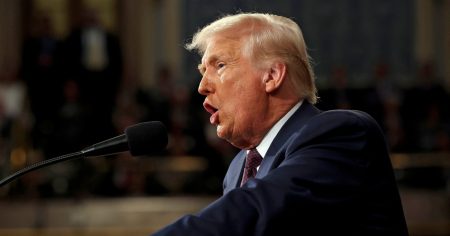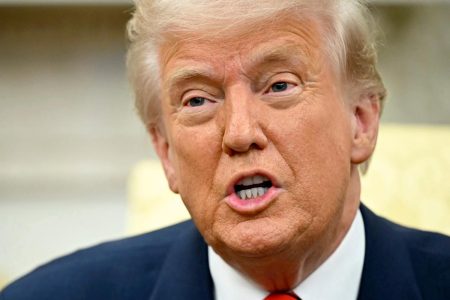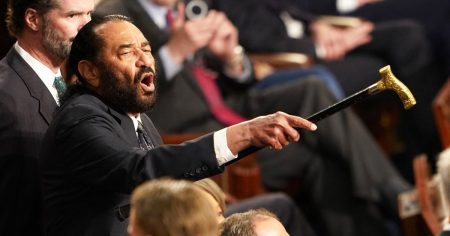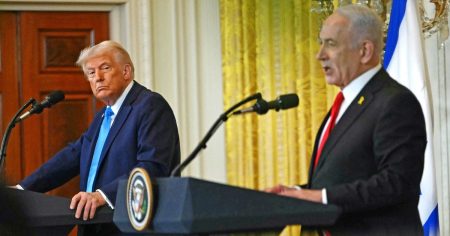Tulsi Gabbard Sworn In as Director of National Intelligence Amid Controversy
A Surprise Nomination with a Narrow Confirmation
Tulsi Gabbard, a former Democratic congresswoman from Hawaii and a military veteran, was sworn in as President Donald Trump’s Director of National Intelligence on Wednesday, marking a significant and controversial move in the new administration. Gabbard’s confirmation by the Senate was far from certain, with a narrow 52-48 vote that saw most Republicans backing her despite initial reservations about her experience and judgment. The only Republican to vote against her was Sen. Mitch McConnell of Kentucky, who expressed concerns about her suitability for the role.
Gabbard’s nomination was met with skepticism from many in Washington due to her unconventional background and past statements. She has faced criticism for her sympathetic comments toward Russia, her 2017 meeting with Syrian President Bashar Assad (who has since been deposed), and her previous support for Edward Snowden, the government leaker who fled to Russia. Despite these concerns, Gabbard’s confirmation reflects the administration’s efforts to reshape the federal government, including the intelligence community, in line with Trump’s vision.
The Intel Community Faces a New Leader
As the new Director of National Intelligence, Gabbard will oversee the coordination of 18 federal intelligence agencies, a role that requires both expertise and bipartisan trust. However, Gabbard’s lack of formal intelligence experience and her controversial past have raised eyebrows among lawmakers and security experts. She has no prior experience working within an intelligence agency and has never led a government department or agency.
Speaking after her swearing-in ceremony at the White House, Gabbard pledged to "refocus" the intelligence community on its core mission of ensuring national security, free from politicization. "Unfortunately, the American people have very little trust in the intelligence community, largely because they’ve seen the weaponization and politicization of an entity that is supposed to be purely focused on ensuring our national security," she said. Gabbard’s words resonated with Republican critics of the Office of the Director of National Intelligence, which they argue has grown too large and partisan since its creation after the September 11, 2001, attacks.
Republican Support and McConnell’s Opposition
While many Republicans ultimately supported Gabbard’s nomination, some expressed lingering concerns about her past actions and statements. Sen. Lisa Murkowski of Alaska, for example, noted that while she still had reservations about Gabbard’s stance on issues like Snowden and Syria, she appreciated her commitment to streamlining the agency’s scope. "She will bring independent thinking to the job," Murkowski said.
However, McConnell was unconvinced, stating that Gabbard’s history of "alarming lapses in judgment" made her a risky choice. He warned that her past actions could taint the intelligence assessments provided to the president. McConnell also criticized Republicans who voted for her, implying that they were giving in to pressure from Trump and his allies.
Democrats Sound the Alarm Over Gabbard’s Nomination
Democrats were even more vocal in their opposition to Gabbard, arguing that her past actions and statements disqualified her from leading the intelligence community. Senate Democratic leader Chuck Schumer of New York accused Republicans of caving to Trump’s pressure, saying, "We simply cannot in good conscience trust our most classified secrets to someone who echoes Russian propaganda and falls for conspiracy theories." Schumer also questioned whether Gabbard would stand up to Trump if necessary and whether she could maintain vital intelligence-sharing relationships with U.S. allies.
Gabbard’s praise of Snowden, her meeting with Assad, and her skepticism about Assad’s use of chemical weapons were particularly contentious points during her confirmation hearing. While Gabbard acknowledged that Snowden broke the law by leaking classified information, she defended his actions as having exposed unconstitutional surveillance programs. She also defended her meeting with Assad, claiming she used the opportunity to press him on human rights abuses.
A Broader Shift in the Trump Administration’s Agenda
Gabbard’s confirmation is part of a larger effort by the Trump administration to reshape the federal government, particularly the intelligence apparatus. Staffers at the CIA and other intelligence agencies have reportedly received buyout offers, while lawmakers and security experts have raised concerns about Elon Musk’s involvement in the Department of Government Efficiency and its access to sensitive intelligence databases.
Trump himself has long been critical of the intelligence community, which he has accused of being politicized and biased against him. His choice of Gabbard reflects his desire to install leaders who share his skepticism of the establishment and his vision for a more streamlined intelligence community.
The Road Ahead for Gabbard and the Intel Community
As Gabbard takes on her new role, she faces significant challenges, both internally and externally. She must navigate the complex web of intelligence agencies, rebuild trust with allies, and address the growing threats to national security. Her ability to stay independent and impartial will be closely watched, particularly given her history of controversial statements and alliances.
The outcome of her tenure will have far-reaching implications for the intelligence community and the nation as a whole. Whether Gabbard can rise above her past controversies and lead effectively remains to be seen, but one thing is clear: her appointment marks a dramatic shift in the direction of U.S. intelligence under the Trump administration.









